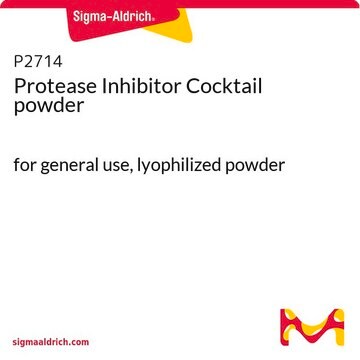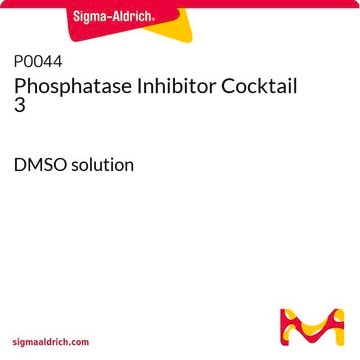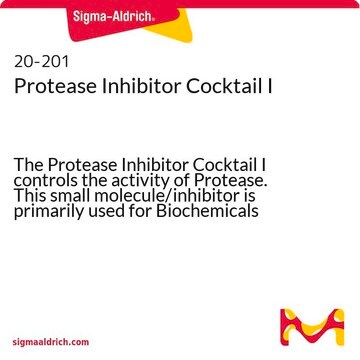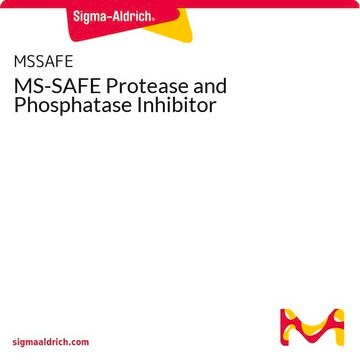P8340
Protease Inhibitor Cocktail
DMSO solution, for the inhibition of serine, cysteine, acid proteases and aminopeptidases, for use with mammalian cell and tissue extracts, DMSO solution
Szinonimák:
Protease Inhibitor Mix
About This Item
Javasolt termékek
product name
Protease Inhibitor Cocktail, for use with mammalian cell and tissue extracts, DMSO solution
biológiai forrás
bovine lung
Minőségi szint
form
DMSO solution
tárolási hőmérséklet
−20°C
Looking for similar products? Látogasson el ide Útmutató a termékösszehasonlításhoz
Related Categories
Általános leírás
Egyediség
Alkalmazás
Provides protection against endogenous enzyme activity in cell and tissue extracts
Biokémiai/fiziológiai hatások
Tulajdonságok és előnyök
Stable storage: supplied as a solution in DMSO, allowing for long-term storage at -20°C
Consistent performance: ready-to-use solution
Komponensek
Aprotinin
Bestatin
E-64
Leupeptin
Pepstatin A
Vigyázat
Elkészítési megjegyzés
Egyéb megjegyzések
gyakran vásárolják ezzel a termékkel együtt
kapcsolódó termék
Figyelmeztetés
Warning
Figyelmeztető mondatok
Óvintézkedésre vonatkozó mondatok
Veszélyességi osztályok
Eye Irrit. 2 - Skin Irrit. 2
Tárolási osztály kódja
10 - Combustible liquids
WGK
WGK 2
Lobbanási pont (F)
188.6 °F - closed cup
Lobbanási pont (C)
87 °C - closed cup
Analitikai tanúsítványok (COA)
Analitikai tanúsítványok (COA) keresése a termék sarzs-/tételszámának megadásával. A sarzs- és tételszámok a termék címkéjén találhatók, a „Lot” vagy „Batch” szavak után.
Már rendelkezik ezzel a termékkel?
Az Ön által nemrégiben megvásárolt termékekre vonatkozó dokumentumokat a Dokumentumtárban találja.
Az ügyfelek ezeket is megtekintették
Related Content
Research evaluating immune checkpoints may help identify those likely to benefit from PD-1/PD-L1 immunotherapy and reveal new immunotherapy targets for future investigation. See how the MILLIPLEX® Human Immuno-Oncology Checkpoint Protein Panel 2 was used to multiplex immune checkpoint molecules for NSCLC research.
Select different protease inhibitor types based on your needs to prevent protein degradation during isolation and characterization and safeguard proteins in sample prep.
Válasszon különböző proteáz-inhibitor típusokat az igényei alapján, hogy megakadályozza a fehérjék lebomlását az izolálás és jellemzés során, és megóvja a fehérjéket a mintaelőkészítés során.
Tudóscsoportunk valamennyi kutatási területen rendelkezik tapasztalattal, beleértve az élettudományt, az anyagtudományt, a kémiai szintézist, a kromatográfiát, az analitikát és még sok más területet.
Lépjen kapcsolatba a szaktanácsadással













